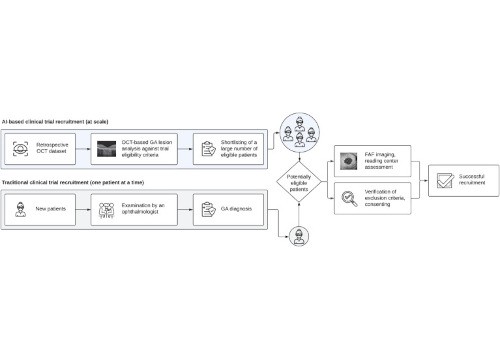Industry News
AI Model to Improve Clinical Trial Recruitment for Eye Disease
 A groundbreaking artificial intelligence (AI) system has been developed by researchers from UCL and Moorfields Eye Hospital, aimed at revolutionising the recruitment process for clinical trials focused on Geographic Atrophy (GA), a severe form of age-related macular degeneration (AMD). This innovative system promises to significantly reduce the time and costs associated with finding suitable trial participants.
A groundbreaking artificial intelligence (AI) system has been developed by researchers from UCL and Moorfields Eye Hospital, aimed at revolutionising the recruitment process for clinical trials focused on Geographic Atrophy (GA), a severe form of age-related macular degeneration (AMD). This innovative system promises to significantly reduce the time and costs associated with finding suitable trial participants.
Geographic Atrophy affects between 5 to 10 million individuals worldwide and has historically lacked effective treatments. However, the recent FDA approval of two medications in 2023, which show modest efficacy, has catalysed a surge in clinical trials targeting this condition. The new AI system addresses a critical challenge in these trials: the recruitment of adequate numbers of eligible patients.
The AI model was assessed using a dataset of 602,826 optical coherence tomography (OCT) retinal scans from a diverse group of 306,651 patients treated at Moorfields between 2008 and 2023. By employing advanced algorithms, the AI identified potential candidates for GA trials with remarkable efficiency. In comparison to traditional methods that rely on keyword searches within electronic health records (EHR), the AI system was able to identify nearly double the number of eligible candidates, achieving higher precision in its selections.
For instance, in one specific trial, the AI shortlisted 1,139 patients with a precision of 63%, while the EHR method identified only 693 patients with an accuracy of 40%. When combining both AI and EHR approaches, the number of eligible patients identified rose to 604, with an impressive precision of 86%.
The development of this AI system leverages the extensive computing resources and curated datasets provided by the INSIGHT Health Data Research Hub Programme at Moorfields, which is recognised as the largest bioresource of ophthalmic imaging linked to clinical data globally. Notably, the AI's reliance solely on retinal scans allows it to function effectively in clinical settings where text-based records may not be readily accessible.
Lead author Dominic Williamson, a PhD student in the UKRI UCL Centre for Doctoral Training in AI-enabled Healthcare Systems, said: “Our AI system shows promise for real-world application in recruiting patients for GA clinical trials more efficiently. It could also be developed to identify individuals who may benefit from new treatments as they become available.”
Senior author, Professor Pearse Keane (UCL Institute of Ophthalmology and Moorfields Eye Hospital) said: “This type of AI could prove instrumental in accelerating the development of innovative GA treatments. The research effectively demonstrates the potential for AI in facilitating automated pre-screening for clinical trials in GA, enabling site feasibility assessments, data-driven protocol design, and cost reduction.”
The introduction of this AI system marks a significant advancement in clinical trial recruitment, particularly for conditions like Geographic Atrophy. By improving the efficiency and accuracy of patient selection, this technology not only enhances the feasibility of clinical trials but also holds promise for better treatment outcomes in the future. The research findings have been published in Ophthalmology Science, underscoring the potential impact of AI in transforming clinical research methodologies.



